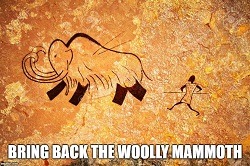The Accurate Reloading Forums
Eye Candy
05 October 2011, 07:58
Aspen Hill AdventuresEye Candy
He's not for hunting but I figured you all might like to see a close up of the plumage on a Temminck's Tragopan.


~Ann

05 October 2011, 09:49
N E 450 No2Very pretty. Where do you find such a bird. Is it just for looking at, or are they raised for food???
DOUBLE RIFLE SHOOTERS SOCIETY
05 October 2011, 18:42
Aspen Hill AdventuresThey are commonly kept in aviaries. This is my only one at the moment, a young male just achieving his adult plumage. I imagine they are hunted in their native land, northern India, the Himalayas, etc as upland birds.
There are several species of Tragopans, they seem inbetween pheasants and grouse. But are considered a pheasant.
~Ann

06 October 2011, 00:57
collectorThe coolest feature on Tragopan species are the "bib" and the "horns". They get engorged with blood when they are trying to impress the female. The bib gets so big that it almost touches the ground ( no Viagra jokes please

)

06 October 2011, 05:05
Aspen Hill AdventuresTrue! My guy isn't old enough to display yet but I bet he will for me next spring. He does show his horns when I feed him. The color is amazing.
There are some neat videos on a website called ARKive if you want to explore more about this and other Galliformes. I am always amazed at how many species there are in the world which comprise pheasants and the like.
If I had my way I would have an aviary with capercaille and another with blood pheasants too!
That's a beautiful mount.
~Ann

06 October 2011, 18:12
collector@Ann
I believe there are 48 full species of pheasants and 17 full species of grouse in the world....If you start counting subspecies then the numbers will get quite high real fast.
06 October 2011, 18:52
Aspen Hill AdventuresCollector, would you mind if I posted your photo over on the GBWF forums?
~Ann

06 October 2011, 19:00
JackduckhunterVery cool!!
07 October 2011, 05:17
NakihunterGreat one Ann.
No you cannot hunt these birds as they are seriously endangered. The western tragopan is the rarest pheasant in the world. It is so rare that the first photo in the wild was taken only in the late 70s or 1980. I attended a WPA presentation in Delhi & saw those slides when I was at University. They have now found 2 more small areas in Kashmir with the Western species.
http://indiasendangered.com/we...w-ranges-in-kashmir/
"When the wind stops....start rowing. When the wind starts, get the sail up quick."
07 October 2011, 06:44
Aspen Hill AdventuresHey Naki,
I knew about the Western's, too bad we don't have them in aviculture here in the US. I think the other two (or three?) species are doing OK, they are being bred here and in Europe.
Do you know if Tragopans and other Indian pheasant species are available there in NZ? Do the Blood pheasants occur in India?
~Ann

10 October 2011, 00:59
NakihunterHi Ann
I doubt if you can get wester tragopan anywhere at all. They are so rare. The eastern species from the NE Indian hills is found sometimes.
Yes the Blood Pheasant is from the Himalayas.
In NZ we get the Golden Pheasant - I bought some ringneck and golded eggs and hatched them under a bantam but I was not successful in rearing the chicks.
"When the wind stops....start rowing. When the wind starts, get the sail up quick."
10 October 2011, 01:09
NakihunterHere is a list of most of the related species of birds from India
http://www.birding.in/orders/galliformes.htmI am not sure if the Peacock Pheasant is in that list but you do get them in NE India but very rare. The Kalij pheasant has several sub species - the full black, white back, white breast etc. I saw a pair at a range of less than 20 feet when trekking in the himalayas 25 years ago. The male is so stunning in the way it flits around like a flycatcher, opening & closing its crest. I also spooked a Monal cock which flew across the gully to the next ridge.
"When the wind stops....start rowing. When the wind starts, get the sail up quick."
10 October 2011, 01:41
Aspen Hill AdventuresMonals are also immensly beautiful creatures, unreal. They are common here and I will have a pair someday.
That's an excellent website, thanks for the link!
~Ann











